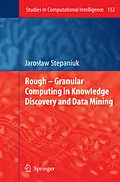The book "Rough-Granular Computing in Knowledge Discovery and Data Mining" written by Professor Jaroslaw Stepaniuk is dedicated to methods based on a combination of the following three closely related and rapidly growing areas: granular computing, rough sets, and knowledge discovery and data mining (KDD). In the book, the KDD foundations based on the rough set approach and granular computing are discussed together with illustrative applications. In searching for relevant patterns or in inducing (constructing) classifiers in KDD, different kinds of granules are modeled. In this modeling process, granules called approximation spaces play a special rule. Approximation spaces are defined by neighborhoods of objects and measures between sets of objects. In the book, the author underlines the importance of approximation spaces in searching for relevant patterns and other granules on dfferent levels of modeling for compound concept approximations. Calculi on such granules are used for modeling computations on granules in searching for target (sub) optimal granules and their interactions on different levels of hierarchical modeling. The methods based on the combination of granular computing, the rough and fuzzy set approaches allow for an effcient construction of the high quality approximation of compound concepts.
Klappentext
This book covers methods based on a combination of granular computing, rough sets, and knowledge discovery in data mining (KDD). The discussion of KDD foundations based on the rough set approach and granular computing feature illustrative applications.
Inhalt
I: Rough Set Methodology.- Rough Sets.- Data Reduction.- II: Classification and Clustering.- Selected Classification Methods.- Selected Clustering Methods.- A Medical Case Study.- III: Complex Data and Complex Concepts.- Mining Knowledge from Complex Data.- Complex Concept Approximations.- IV: Conclusions, Bibliography and Further Readings.- Concluding Remarks.
